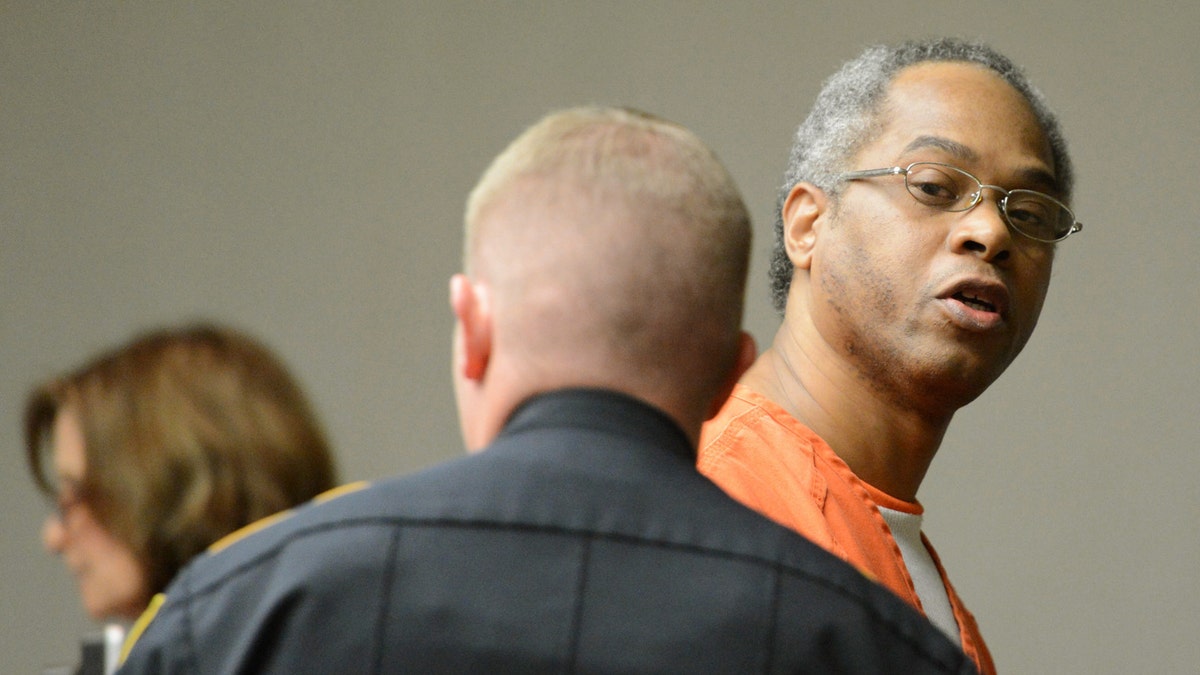
In this Nov. 15, 2012 photo, Carl Henry Blue looks back at family and friends while being escorted back to jail after having his execution date set at the Brazos County Courthouse in Bryan, Texas. Blue never disputed filling a convenience store drink cup with gasoline, tossing it on his former girlfriend at the door of her apartment and setting her ablaze. Nineteen days after the September 1994 incident, 38-year-old Carmen Richards-Sanders died of her burns. Now, more than 18 years later, Blue, 48, is set to die Thursday, Feb. 21, 2013, evening for what he contended was a prank gone bad and for what prosecutors successfully argued was capital murder. Blue’s execution would be the first this year in Texas, the nation’s most active death penalty state. Fifteen inmates were executed last year. Blue is among at least 12 Texas prisoners scheduled for lethal injection in the coming months. (AP Photo/Bryan-College Station Eagle, Dave McDerman) (The Associated Press)
HUNTSVILLE, Texas – A man convicted of killing his ex-girlfriend by dousing her with gasoline and setting her on fire was executed in Texas on Thursday after the U.S. Supreme Court refused his final appeal.
Carl Blue, 48, was condemned to die for attacking Carmen Richards-Sanders at her apartment in Bryan, about 100 miles northwest of Houston, in September 1994. He also tossed gasoline on a man in the apartment, but the man survived and testified against Blue.
Blue claimed it was a prank gone wrong, but prosecutors said it was an intentional attack sparked by jealously.
In his final statement, Blue greeted his victim's daughter, Terrella Richards, as she entered the death chamber viewing area by telling her he loved her.
"I never meant to hurt your mama," Blue said while strapped to a gurney. "If I could change that, I would. ... I hope you can forgive me."
He then told his parents, watching from an adjacent room, that he loved them and acknowledged he had done something wrong. He said he was "paying the ultimate justice. ... It may be crooked justice but I forgive those people."
He later added: "Cowboy up. I'm fixin' to ride, and Jesus is my vehicle."
Blue took about a dozen breaths as the lethal drug began taking effect. He said he could "feel it," then slipped into unconsciousness before being pronounced dead at 6:56 p.m.
Richards declined to take questions after the execution, but said her journey was over. "I can move on with my life," she said. "My journey has ended today."
Prosecutors said Blue walked seven miles from his home to a convenience store, and had been drinking malt liquor and smoking crack behind the store, when he bought 50 cents' worth of gasoline and put in a "Big Gulp" cup.
Court records said he waited outside Richards-Sanders' apartment, then when she opened the door, rushed in and told her: "I told you I was going to get you." He then doused Richards-Sanders and set her ablaze.
When Blue discovered Larence Williams at the apartment, he threw what was left of the gasoline on Williams, setting him on fire.
"He had only one true love in his life ... and here she was with another guy," recalled John Quinn, the lead defense attorney at Blue's 1995 trial.
Hours after the attack, Blue turned himself in to police.
"When I went to knock, she snatched the door open and had a cigarette," Blue told police in a tape-recorded statement played at his trial. "I wasted gas on both of them. And she caught on fire, and he caught on fire, and I took off running ... I was scared, man."
Shane Phelps, a prosecutor at Blue's punishment trial, said Richards-Sanders was trying to start her life over after she and Blue broke up months earlier, "and Carl wasn't part of that, and that was a problem for Carl."
In appeals this week, Blue's attorney, Michael Charlton, argued that it was a conflict of interest for one of Quinn's co-counsels to represent him in appeals because he likely wouldn't contend his previous work was deficient. The conflict "resulted in valuable and worthwhile claims not being presented to any court," Charlton said.
But the Texas Attorney General's office said the federal appeals were meritless because Blue had waived his right to a different lawyer, negating the conflict claim.
Five years after Blue's conviction, his death sentence was among about half a dozen in Texas overturned by a federal judge who ruled it was improper for a former state prison psychologist to testify that the black man's race could indicate a propensity for violence. But Blue again was sentenced to die at a second punishment trial in 2001.
His was the first execution this year in the nation's most active death penalty state. At least 11 other prisoners are scheduled for lethal injection in the coming months in Texas, which executed 15 inmates last year.

